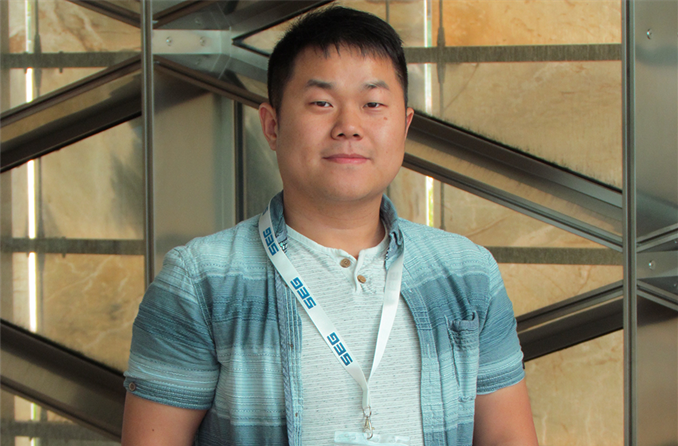KAUST Ph.D. student wins best student presentation

KAUST Ph.D. student Zhaolun Liu won the best student presentation at the 2017 Society of Exploration Geophysicists (SEG) Full-Waveform Inversion (FWI) and Beyond Workshop. Photo courtesy of the PSE Division.
-By David Murphy, KAUST News
Zhaolun Liu, a KAUST Ph.D. student supervised by Professor Gerard Schuster, was awarded the best student presentation at the 2017 Society of Exploration Geophysicists (SEG) Full-Waveform Inversion (FWI) and Beyond Workshop. The annual event, which was held in Beijing, China, from November 20 to 22, 2017, focuses on the communication of new discoveries for full-waveform inversion (FWI) theories and applications. Liu's winning presentation was entitled "3D Wave-Equation Dispersion Inversion of Surface Waves."
"The SEG Full-Waveform Inversion (FWI) and Beyond Workshop focuses on the communication of new discoveries for FWI, which is considered a final solution of seismic imaging. It is extremely attractive because of its capability to construct high fidelity and high-resolution physical models, including rock density, seismic velocity, anisotropy, etc. There were a lot of leading scientists from academia and industry in attendance to present their research results on FWI," Liu noted.
A focus on equation dispersion inversion
The paper on which the presentation was based was co-authored by Zhaolun Liu, Jing Li, a postdoctoral fellow, and Professor Schuster. Their paper describes a new and robust method called wave equation dispersion inversion (WD). The WD method is used for inverting surface waves for shear-wave velocity distribution in the earth or in engineering structures.
"I was very happy to present my work and win the award. I appreciate my supervisor Gerard Schuster and my co-author Jing Li. They helped me a lot and guided me to the topic that I presented on at the conference. KAUST gives me the opportunity to use state-of-the-art high-performance computing (HPC), and I could not have won the award without this access to HPC," Liu said.
Liu's current research at KAUST is centered on developing a 3-D wave equation dispersion inversion method for data recorded on irregular topography by utilizing machine learning to pick the dispersion curves automatically.
Related stories:
- Rocking the cradle of humankind
- Seismic echo turns into super-resolution images
- KAUST student receives prestigious Mexican award
- Professor Marc Genton and former postdoctoral fellow win the 2017 Wilcoxon Award
- KAUST Ph.D. student wins best student presentation award at ECRS 2017

